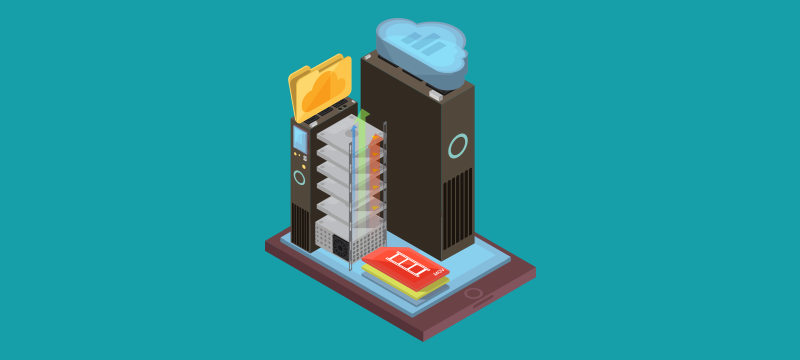Visitors will notice the longer loading times as your website traffic spikes. The majority of web users anticipate that a website will load quickly up to 3 seconds, and if it takes longer than that, they will likely exit the page. The solution for a faster-loading website is SSDs (Solid State Drives). Mechanical drives are typically slower and less reliable than SSDs. For the best speed, especially with dynamic websites, they are crucial. However, not all hosts provide SSD storage, so you must be cautious.
In general, you probably want quick and reliable hosting if you’re looking for SSD-based hosting. Therefore, combining SSDs with dedicated servers or VPS hosting is a good idea. Features like superior performance, reliable CDN, and caching are also advantageous to have.
What is an SSD?
A storage memory with flash memory and controllers with no moving components is what is an SSD. They are competitors and alternatives to a Hard Disk Drive (HDD). SSDs have the same external form factors as HDDs. It is not necessary to completely redesign storage arrays at the data center levels while using the same form factors. SSDs operate far more silently than hard disc drives, offer faster access times, and use less power because they don’t have any moving parts. SSDs are now as durable as disc drives thanks to improvements in reliability.
Benefits of an SSD Drive
- DurabilityThe SSD will keep the data secure in the case of a fall because it has no moving parts. An SSD can endure and handle disturbance better than a traditional HDD, which can suffer significant damage when subjected to a jolt. An SSD experiences less deterioration due to wear and tear. Additionally, SSDs have higher mechanical reliability because they don’t experience mechanical failure. In addition to being a disturbance and temperature-change resistant, the SSD is lighter than an HDD.
- Lower energy consumption Compared to an HDD, a solid-state drive uses less power. This is mostly due to an SSD’s lack of in-motion parts, particularly the absence of a motor. In laptops, computers, and PCs with low power requirements, this is helpful. A high-performance flash-based SSD uses just 50 to 70 percent of the power of an HDD.
- Faster writing and reading speed Faster reading and writing speeds can be found with solid-state discs. The drive platter does not need to rotate on an SSD like it does on an HDD. Additionally, the read-and-write components that seek data (to the drive or to add to the drive) have no actuator arm to move them. Additionally, SSDs have faster reading and writing speeds because data is read and written to flash memory chips instantly
- Permanent Data Erasure For those situations when data protection is crucial, this function is very helpful. There is a probability of recovery when data is erased or deleted on an HDD. There is a possibility that some old data will remain since the new data does not match the old data. Data is permanently wiped from an SSD, leaving no little remnants of the previous data.
- Less to no noise Because SSD relies on computer chips rather than moving parts, it is quieter. There is essentially no noise because it is non-mechanical.
- Fragmentation of files As a result of the SSD’s consistent read performance characteristic, file fragmentation is easy and not a problem. No matter where it is stored, data may be accessed instantly.
- Finer computing performance and quicker boot-up SSDs enable quicker booting of computers because the disc does not need to spin up, enhancing the device’s performance.
- Little to no heat Solid-state drives do not have motors and in-motion parts, hence they produce less heat than the traditional HDD. This is especially a beneficial feature for users who utilize laptops as they will no longer have to worry about the laptop burning up.
Why is SSD important for web hosting?
An SSD drive gives you the fastest-loading website possible. A website hosted on an SSD server can typically load almost 300 times faster than a traditional HDD website. Because an HDD must actually spin completely to find and collect the data it needs to read and write, SSDs are quicker and more efficient whenever access to stored data is required. HDD typically lengthens access time by a few seconds, but depending on the volume of traffic to your website or the complexity of the material being retrieved, those couple of seconds can add up quickly.
Who should choose an SSD server?
- Sites that receive a lot of traffic and are dynamic should nearly always use SSD hosting.
- A website that depends mostly on database results
- Serve up big files, such as those for podcasts or films.
- eCommerce website
Disadvantages of an SSD server
The pricing is the only real drawback to SSD hosting. Although the cost of SSDs has decreased over the past few years, they are still more expensive compared to HDDs, and the price of SSD hosting plans typically reflects this. Therefore, you might want to stick with HDD hosting if you don’t want to spend heavily and your site speed isn’t essential to your success or if you prioritize storage space over speed.
Conclusion
The cost of SSDs can be higher than that of HDDs. The development costs of SSDs are higher than those of HDDs since SSD technology is more recent. However, the overall gap is closing, and over the past few years, SSD prices per GB have dropped significantly. A solid-state drive upgrade and more memory are two simple and affordable ways to improve server speed and performance. Find out more about our Managed Web hosting.
